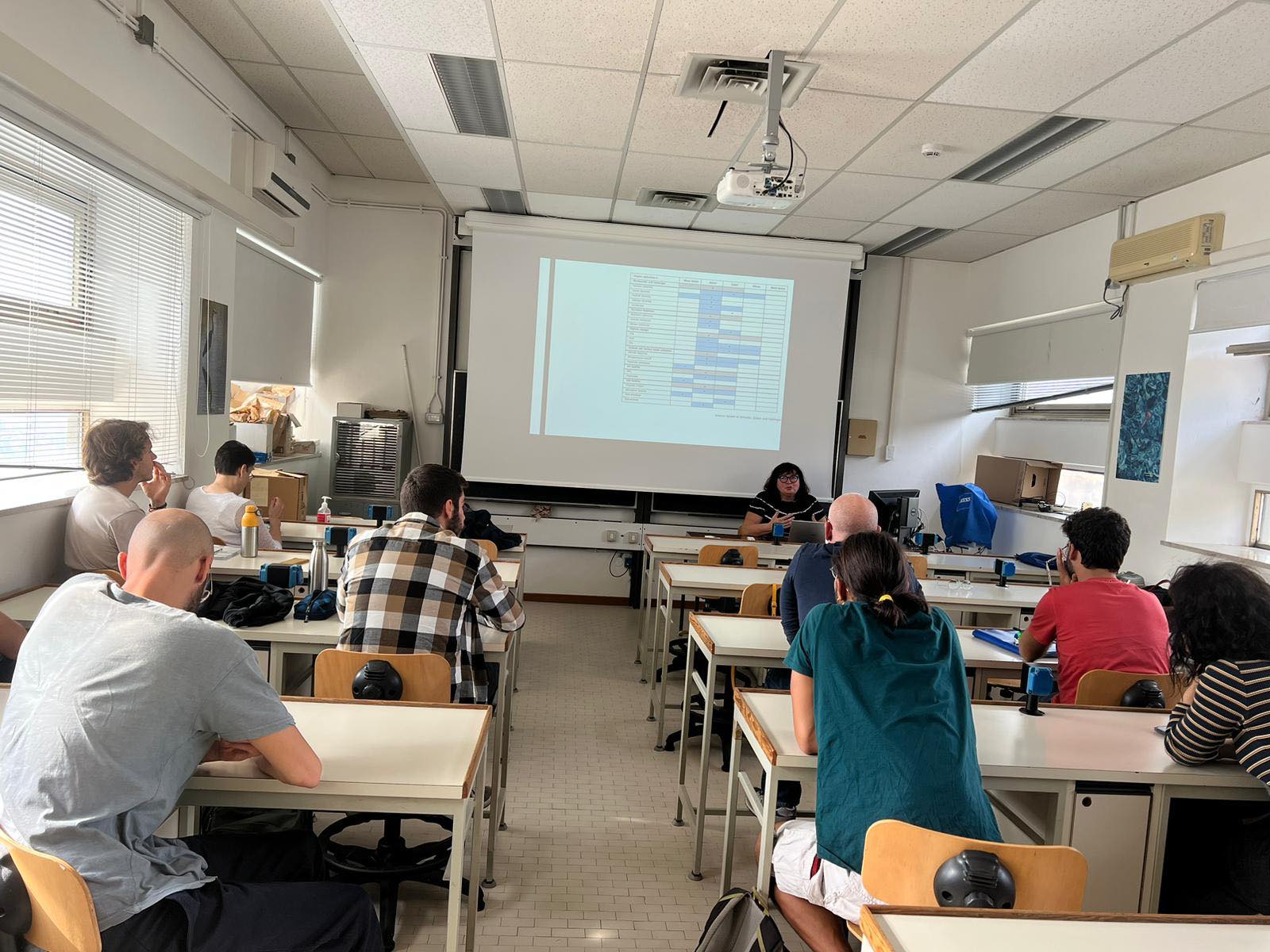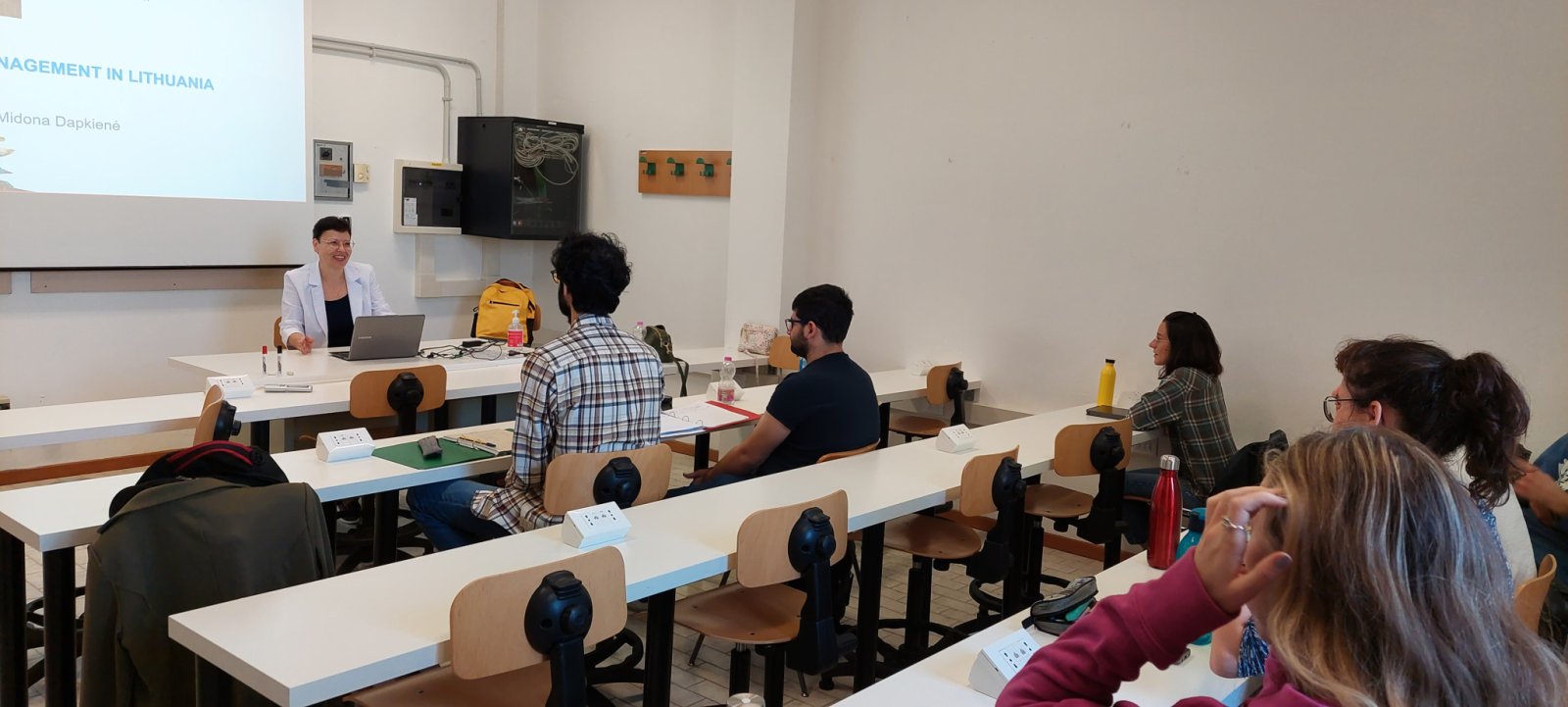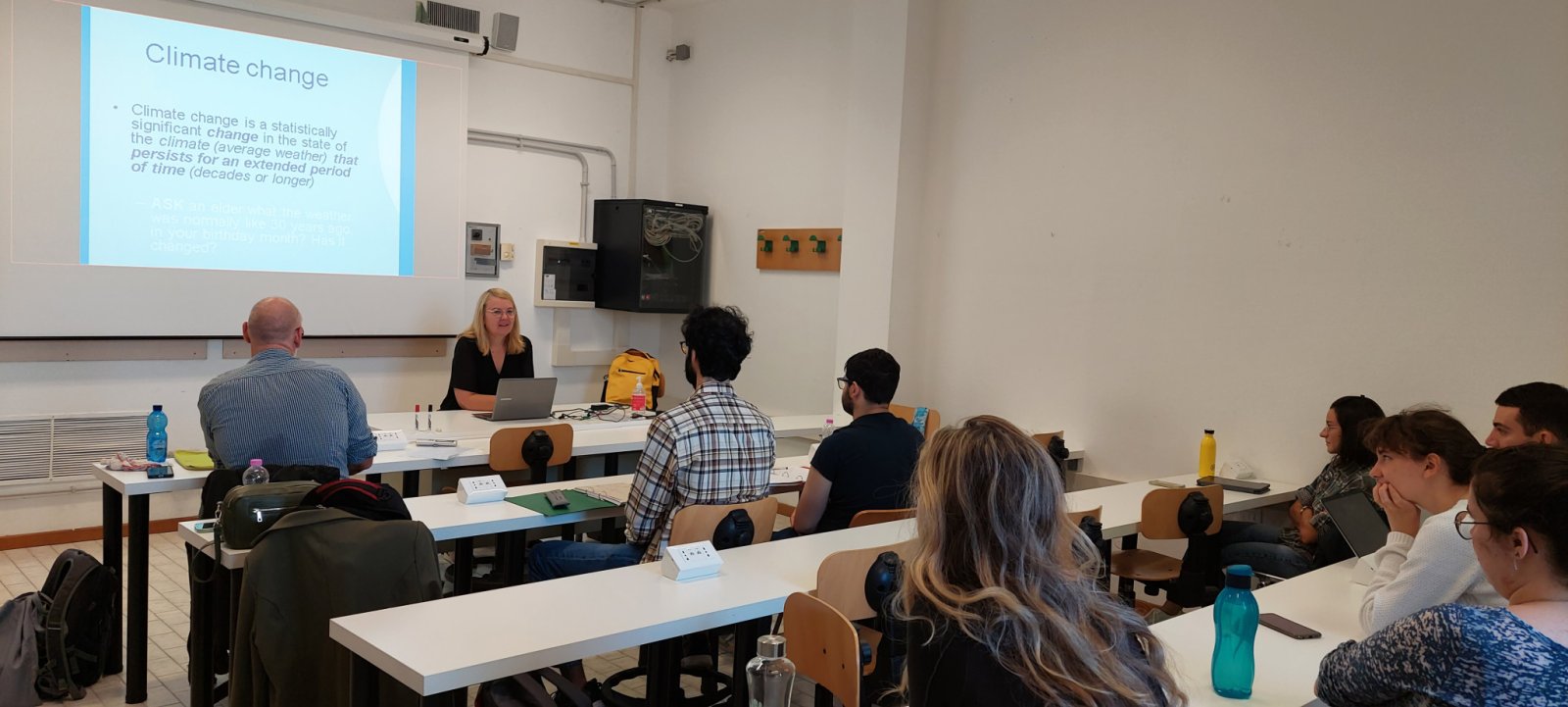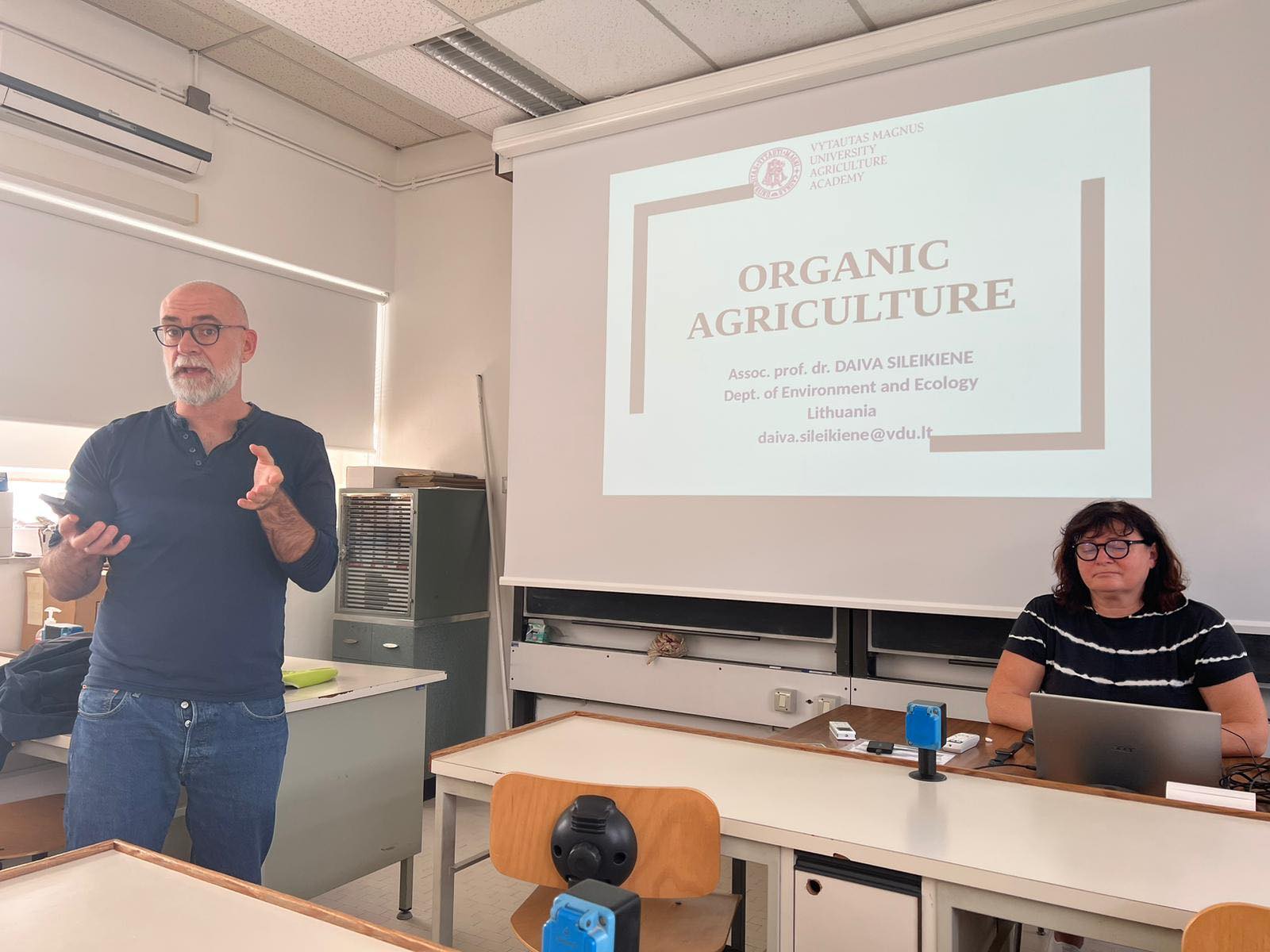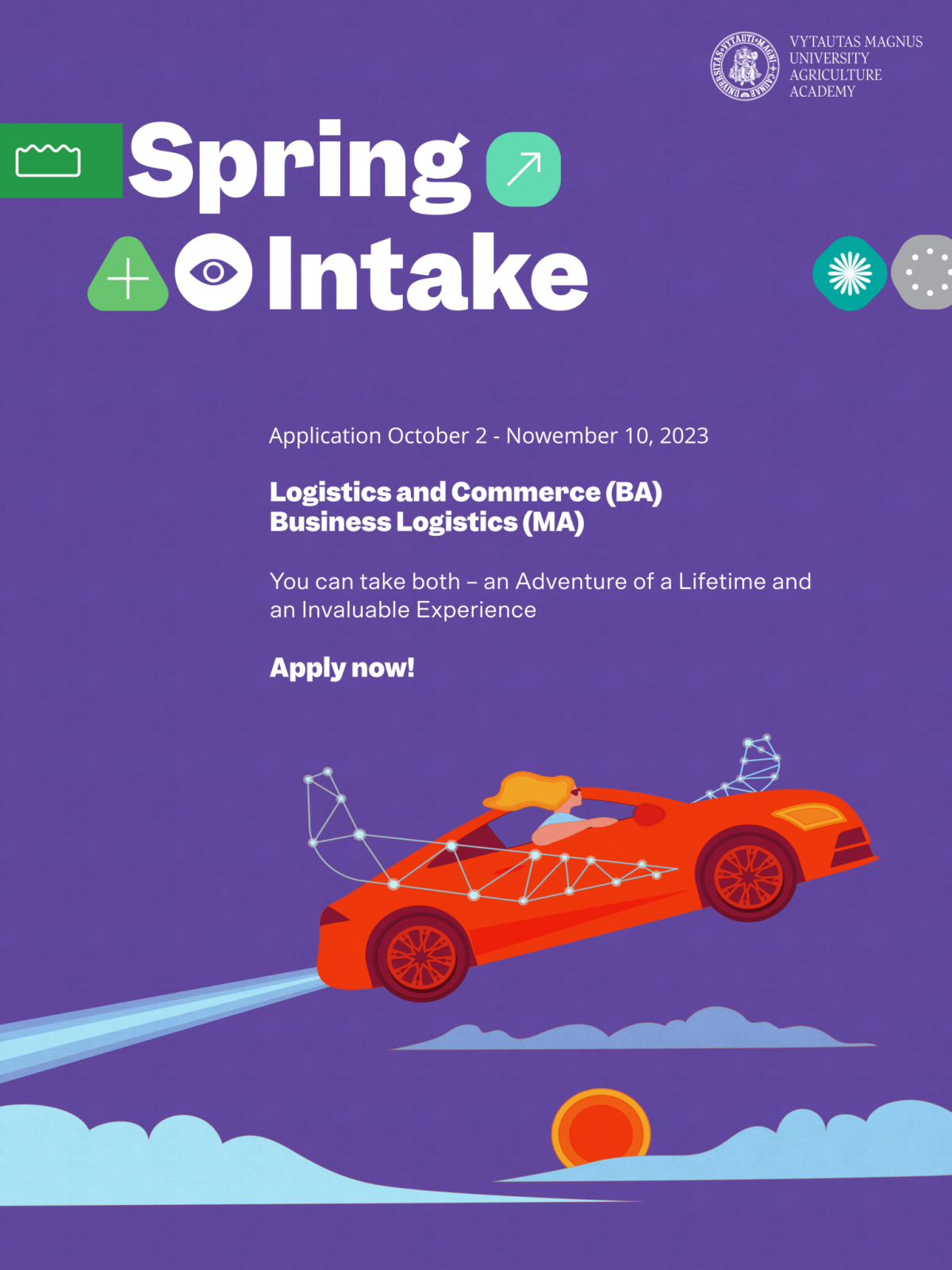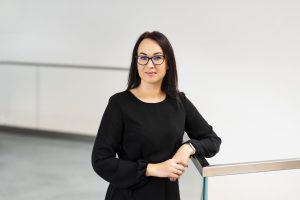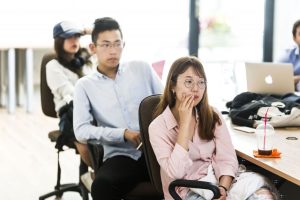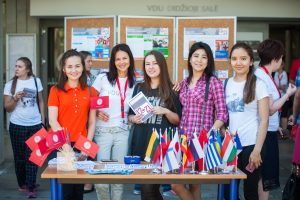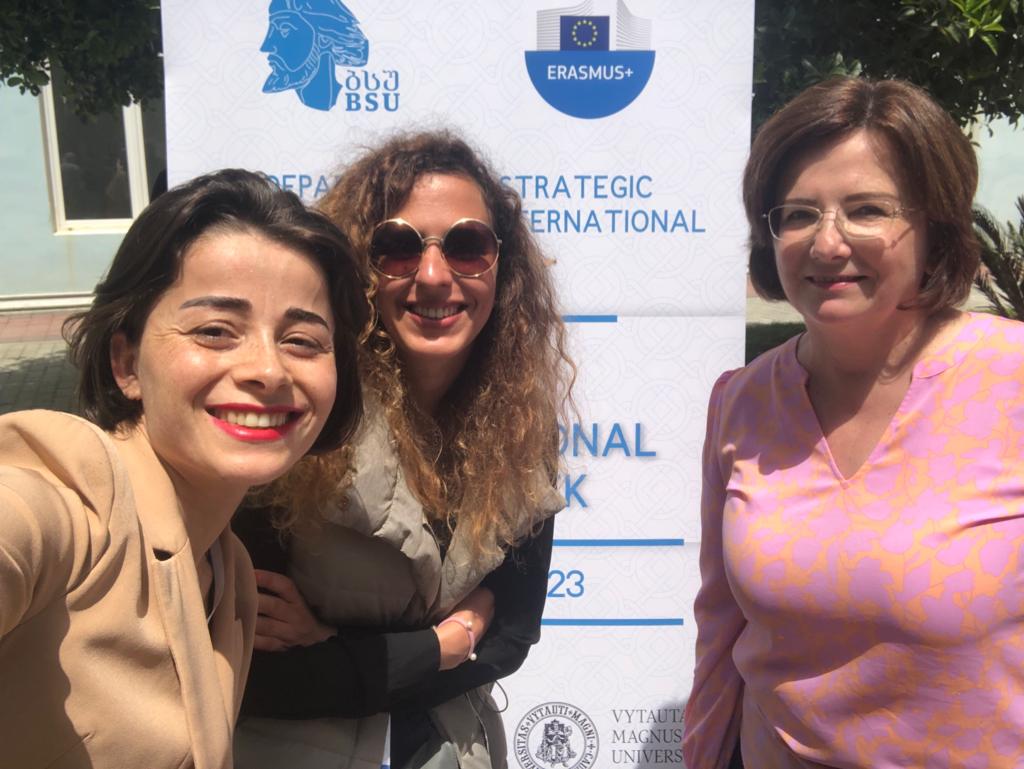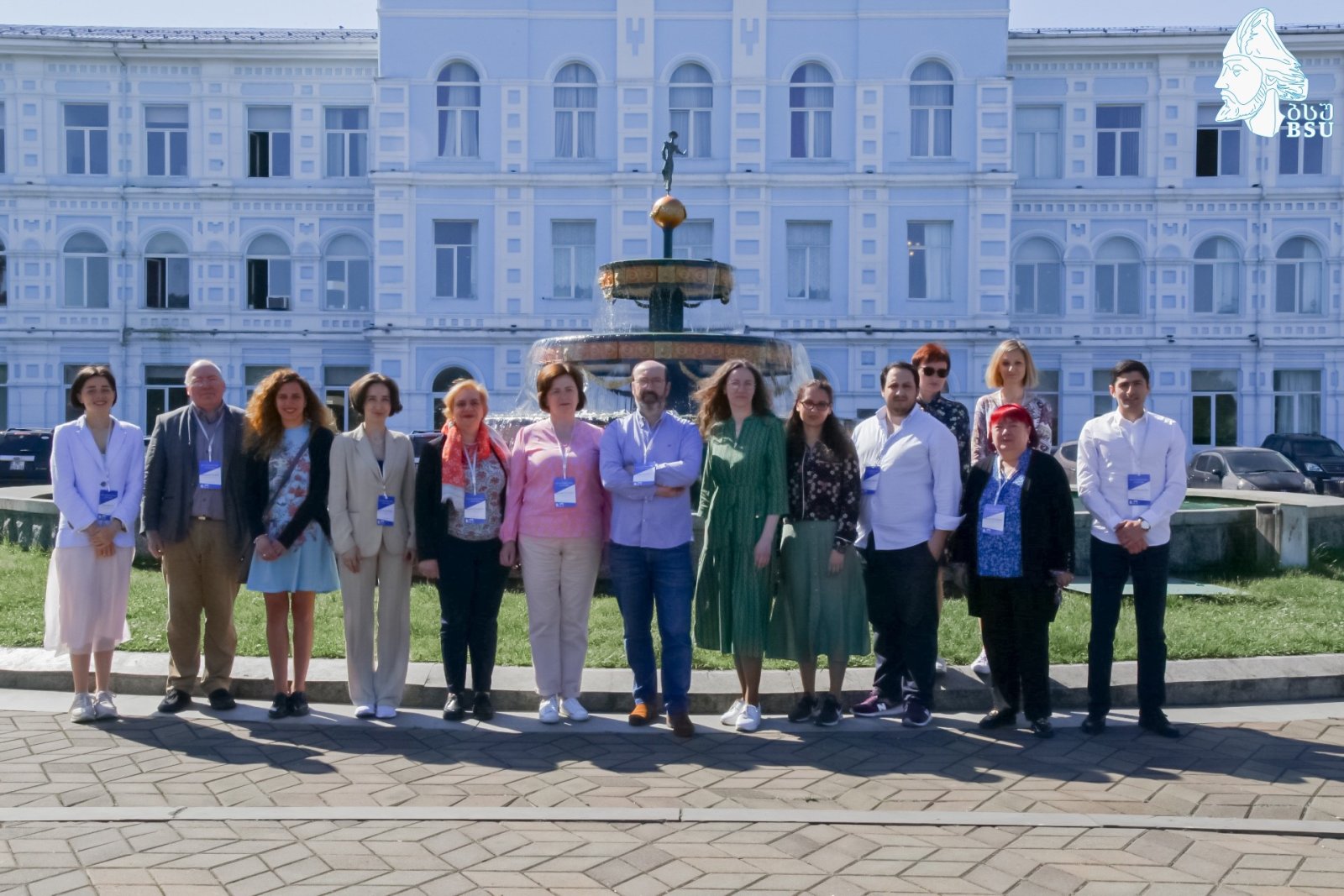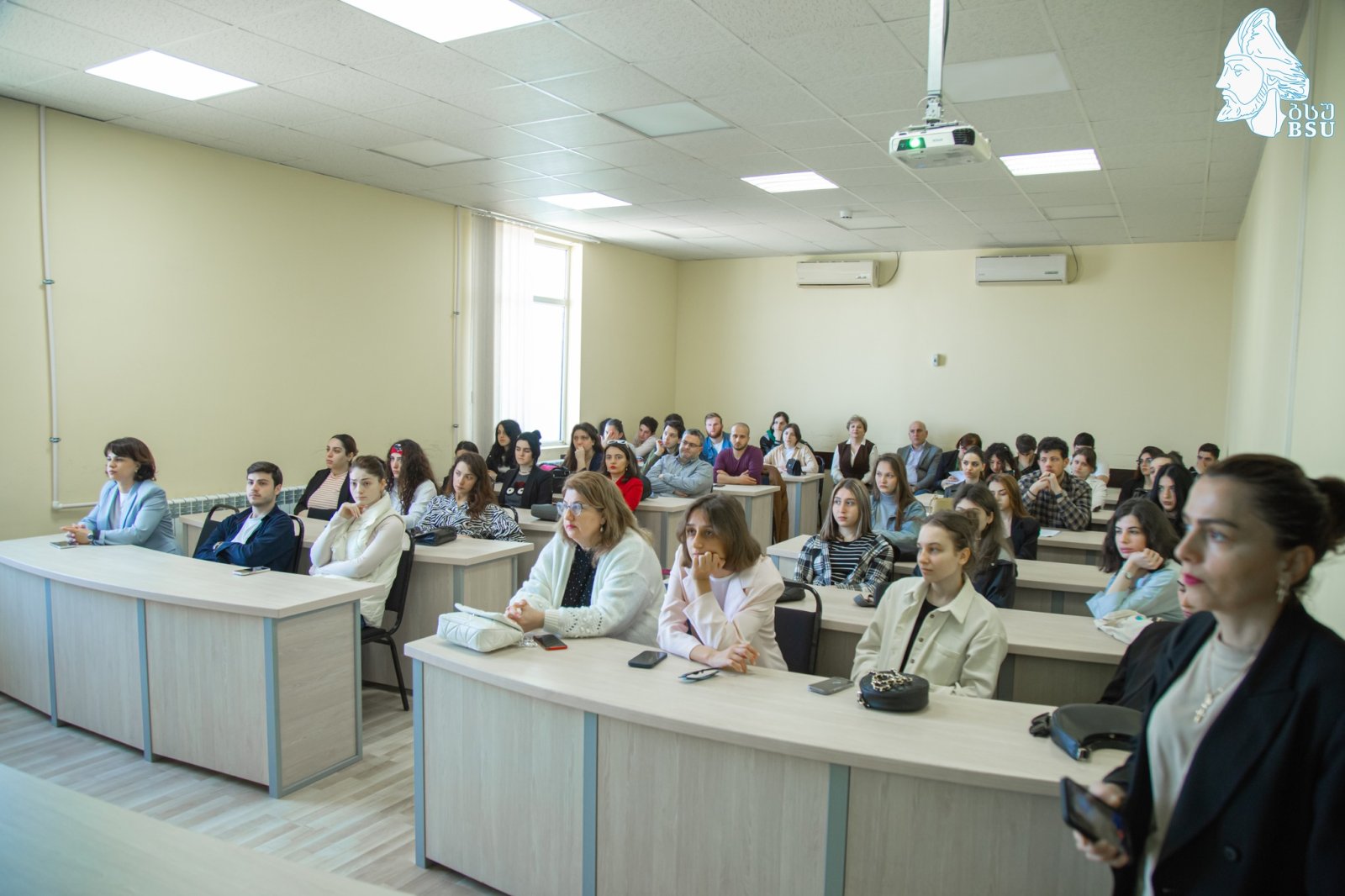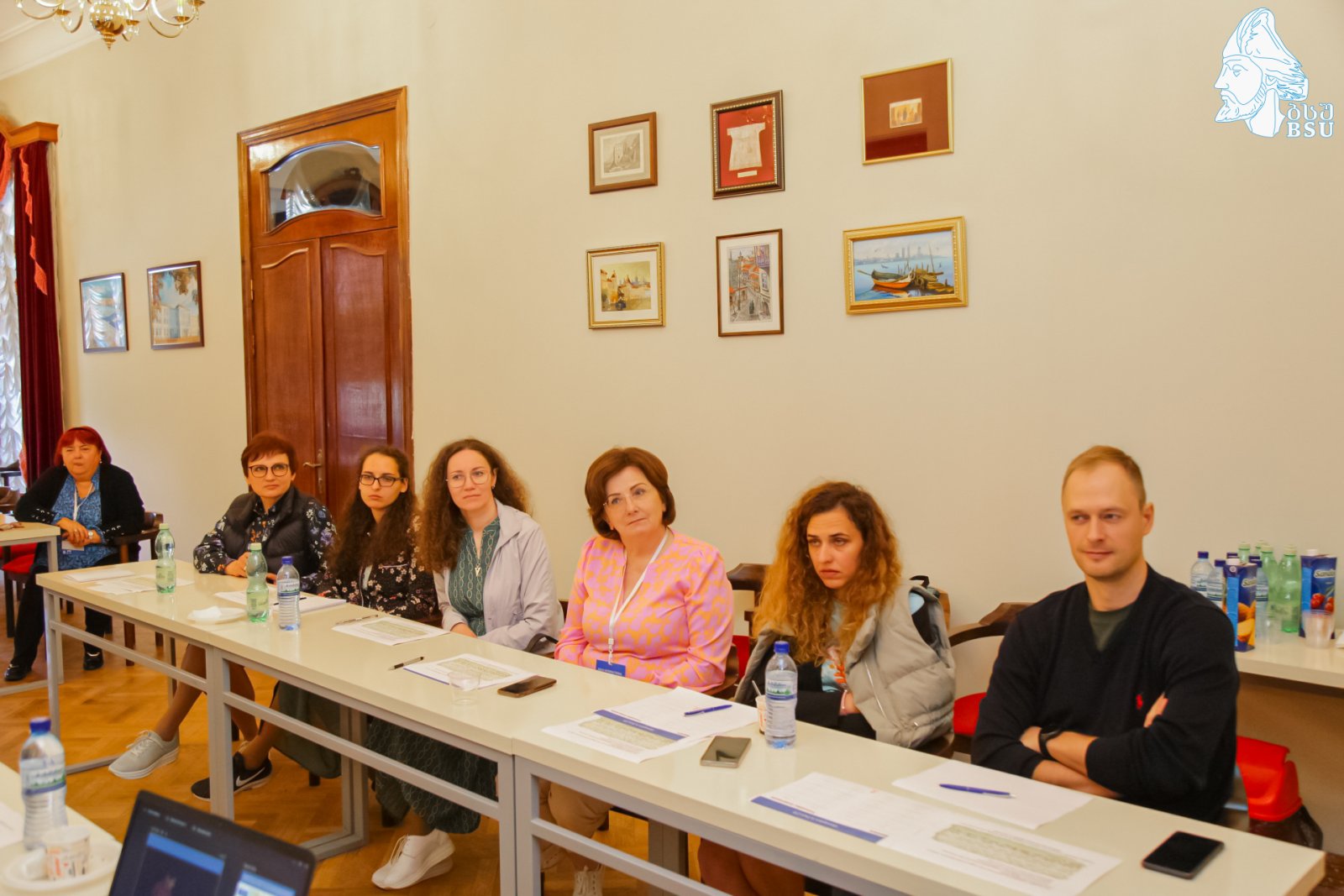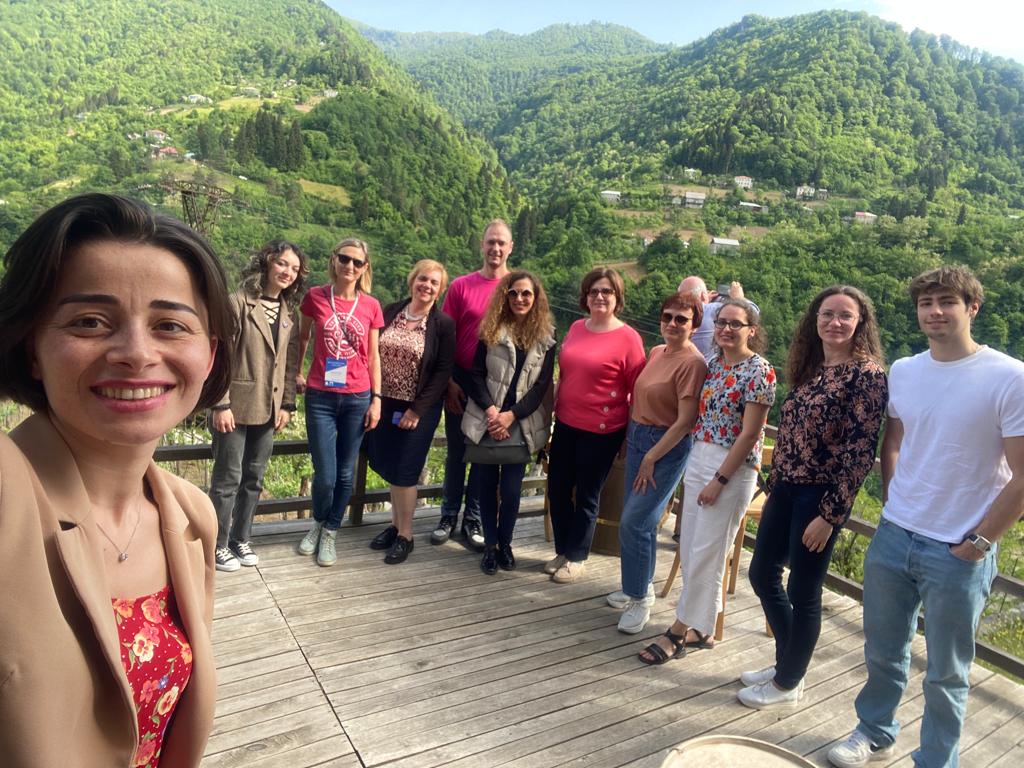Visit of teachers of VMU AA to University of Trieste in Italy
The teachers of Vytautas Magnus University Agriculture Academy (VMY AA) assoc. prof. dr. Midona Dapkienė (Department of Water Engineering, Faculty of Engineering), prof. dr. Laima Česonienė and assoc. prof. dr. Daiva Šileikienė (Department of Environment and Ecology, Faculty of Forest Sciences and Ecology) visited University of Trieste according to Erasmus+ Mobility agreement on October 9th to 12th 2023.
The University of Trieste is a public research university in Trieste in the Friuli-Venezia Giulia region in northeast Italy. The University consists of 10 departments, has a wide and almost complete range of university courses and has about 15,000 students and 1,000 professors.
The teachers of VMU Agriculture Academy presented their University and gave the lectures for students of the master degree programmes in Global Change Ecology and Sustainability as well as in Management of Marine and Coastal Environmental Science. The students of the Environmental and Resource Economics (a master degree programme in Economy) and the PhD students in Circular Economy (a PhD programme in Economy) were invited to some lectures. The topics of lectures were as follows: influence of climate change on surface water status, agricultural activity impact on water quality, wastewater treatment and reuse for soil irrigation, water management in Lithuania, organic agriculture, environmental policy and Green Deal. Masters as well as PhD students also were given a possibility to connect to seminars online. All lectures were recorded and will be used in various training courses.
The representatives of VMU Agriculture Academy had an opportunity to meet the professors Giovanni Bacaro (a coordinator of the master degree programme), Chiara Manfrin, Stefano Martellos, Giuseppe Borruso and Matteo Carzedda and to discuss the possibilities of the joint projects as well as to familiarize with the study process and reasearch at the Department of Life Sciences.
VMU AA Spring Intake 2024. Apply Online Now!
Considering studying abroad? Would like to gain strong knowledge, solid skills, and invaluable international experience? Thinking about an unforgettable European student adventure studying in Lithuania, located in the center of Europe? Would like to live in Kaunas – a city of European Capital of Culture 2022?
Choosing studies at VMU Agriculture Academy You can take both – an Adventure of a Lifetime and an Invaluable Experience.
Spring Intake Application: October 2 – November 10, 2023.
Spring intake study programmes:
Logistics and Commerce (BA)
Business Logistics (MA)
Information about Application and Admission Procedures: Admission to Degree Studies | VDU
Information about Scholarships: Scholarships | VDU
APPLY HERE
Contact person: VMU Agriculture Academy International Coordinator Ekaterina Makrickiene ekaterina.makrickiene@vdu.lt +370 37 752 200
More Information about VMU Agriculture Academy study programmes: Study programmes for international students | VDU Žemės ūkio akademija
GFarm project: Transforming Tomorrow
Project summary
European strategic alignment:
- Green Deal
- Farm to Fork Strategy
- Carbon Farming
- Mission “A Soil Deal for Europe”
- Common Agricultural Policy (CAP)
- The new EU forest strategy for 2030
Achieving emission reduction targets requires a careful assessment of GHG calculation methodologies and a closer look at soils high in organic carbon. Even a tiny change to one side or the other can significantly change the balance.
Challenges
- Lack of common procedures and holistic approaches for AFOLU sectors’ climate impact assessment at scale.
- Underdeveloped technological ecosystem for GHG emission and sequestration monitoring, accounting and informed decision-making with the AFOLU sector.
- Insufficient positive incentives to promote behavioural change with the AFOLU sector and support the transition towards carbon farming practices.
Objectives
- Holistic Methodology
- GHG monitoring database and carbon register
- Data calculation and measuring technological infrastructure
- Recommendations for promoting a carbon farming system
Project team:
- AgriFood Lithuania DIH LT (coordinator)
- UAB ART21 (partner)
- UAB DOJUS AGRO LT (partner)
- UAB LITAGRA LT (partner)
- NATIONAL PAYING AGENCY (partner)
- VALSTYBINE MISKU TARNYBA (partner)
- VYTAUTO DIDZIOJO UNIVERSITETAS (partner)
- LIETUVOS MISKO IR ZEMES SAVININKU ASOCIACIJA (partner)
- UAB MELDA (partner)
- UAB STRATEGY LABS (partner)
Postdoctoral internships at VMU AA: Call for applications for funding
The Lithuanian Research Council, promoting the development of the system of internships for young scientists after doctoral studies and raising the scientific qualifications of interns, announces a call for proposals for the projects of posdoctoral studies.
Vytautas Magnus University Agriculture Academy (VMU AA) invites applications for postdoctoral internships and do an internship at VMU AA in the fields of agriculture, life sciences, business and public management or engineering sciences. Applications for postdoctoral internships are submitted to the Research Council of Lithuanian. Applications for postdoctoral internships are submitted until September 30.
The purpose of postdoctoral fellowships is to promote the development of the system of postdoctoral internships for young scientists and to raise the scientific qualifications of interns (these projects must not aim to create specific products for the market and increase the scale of commercial and technology transfer).
According to this activity, a postdoctoral trainee is understood as a researcher who has a PhD degree awarded by a Lithuanian or foreign research and study institution, and for whom no more than 5 years have passed from the date of the award of the PhD degree to the date of submission of applications specified in the invitation (this period does not include pregnancy and maternity leave, paternity leave or leave to take care of the child until the child turns 3 years old) and carrying out scientific research work provided for in the project. The intern must go to a foreign science and study institution or research center, laboratory, company, institution, library, archive, expedition, etc. for internship.
More information about call for applications for financing postdoctoral internship projects (application process, evaluation procedure, etc.) at Research Council of Lithuania website.
Contact at VMU Agriculture Academy:
Ingrida Ignotaitė
Tel. (8 37) 752 377
E-mail ingrida.ignotaite@vdu.lt
Universiteto str. 8A, Akademija, LT-53341, Kaunas distr.
BIC offering student internships for 2023-2024
Bio-Based Industries Consortium (BIC) is offering some motivating internship placements for the academic year 2023-2024. The students will be guided and supported by BIC staff and be in contact with them and other stakeholders during their assignment.Not only will students be part of the team, they will also receive a specific project to work on. More details about projects and application process can be found here. The BIC team looks forward to welcoming some interns to Brussels, and sharing our knowledge and work in the bio-based industries with them.
The Study Model at VMU Enables Students to Design Their Own Study Path
If we had to name a university with the most diverse range of offerings, it would be Vytautas Magnus University, which is currently the most comprehensive university in Lithuania – students have the opportunity to choose from a wide range of study programmes, spanning across as many as 14 groups of study fields (by comparison, there are 17 available throughout Lithuania).
Dr. Simona Pilkienė, Vice-Rector for Studies at Vytautas Magnus University (VMU), is delighted that the university offers a study model that is highly attractive and popular in the USA, and is the only one of its kind not only in Lithuania, but also in the Baltic States.
Artes liberales – from philosophy to engineering
Why did we mention the abundance of study fields? It is an essential prerequisite for fostering interdisciplinarity and striving for more effective synergy between different areas of science.
“The concept of artes liberales is often understood narrowly or incorrectly because many people associate the Latin term with the liberal arts and humanities. In reality, however, artes liberales is an educational concept that aims to provide individuals with a comprehensive education, rather than a narrow and highly specialised one, through the study of interdisciplinary and multidisciplinary subjects.
The uniqueness of this concept lies in the student’s role in the study process and the opportunity to personally design their own study path. While this concept is widespread in the USA, it is not as popular in Europe and is usually applied only to a very small part of studies, such as a single programme or faculty, rather than being implemented university-wide. The study model implemented by VMU is the only one of its kind in both Lithuania and the Baltic States,” explains Dr. Pilkienė.
She says that society has been greatly affected by the COVID pandemic, the war in Ukraine, and other unpredictable global events, which have led to the realisation that only individuals with a comprehensive education will be able to succeed in an ever-changing labour market and society, and that interdisciplinary knowledge and skills are the key to all future decisions.
“So, the concept of artes liberales has regained relevance. And for us, it is relatively easy to overcome these challenges because we have years of experience offering exactly this kind of studies, whereas specialised universities are facing issues in transitioning to interdisciplinarity and preparing graduates capable of handling unpredictable challenges,” says the Vice-Rector of VMU.
She is delighted that VMU is able to effectively implement artes liberales: of the 17 groups of study fields available in Lithuania, the University offers 14 (except for health sciences, veterinary sciences, and public security).
When challenges turn into opportunities: gaining international recognition
Recalling the merger of three universities four years ago, when Aleksandras Stulginskis University and Lithuanian University of Educational Sciences merged with VMU, Dr. Pilkienė asserts that it was an unprecedented case:
“Regarding this matter, the experience of foreign countries could not be of much help to us, as there has never been a simultaneous merger of three universities. Nevertheless, we successfully overcame a challenging period in which we had to unify the study process and the approach to quality, and implement the concept of artes liberales in all study programmes.”
According to the Vice-Rector, from today’s perspective, launching programmes with a new concept and simultaneously ensuring a high-quality completion of studies for students who previously enrolled in the former universities seems like a mission impossible.
“I am therefore very delighted that the universities managed to merge successfully in such a short time. What’s more, the restrictions that existed at the time actually turned out to be opportunities. For instance, we were not allowed to run the study programmes of the Lithuanian University of Educational Sciences, so we had to create new ones in a very short time. Now, we see that this was the reason for our breakthrough in teacher training,” says Dr. Pilkienė.
The largest teacher training centre in Lithuania
Drawing on the experience of foreign partners and the concept of artes liberales, the university has developed unique study programmes for training the next generation of teachers, which have gained international recognition.
“The university has become the largest teacher training centre in Lithuania. It has more than 1,300 students, trains teachers from all branches of education at all three study levels, and admits around 500 teachers each year for further training or retraining.
We have also received international recognition – VMU is the only university in Northern and Central Europe and one of the 50 universities in the world to offer the International Baccalaureate Studies (IBS) and the UNESCO Educational Certificate Studies,” says the Vice-Rector.
Dr. Pilkienė notes that engineering, agriculture, and forestry programmes have also been reorganised into innovative and interdisciplinary programmes.
“We prepare graduates who not only have expertise in their field, but also have the ability to communicate in foreign languages and make timely and informed decisions in complex situations. We achieve this through the concept of artes liberales, which allows students to modify their study programmes, choose minor studies, and thereby broaden their horizons,” says Dr. Pilkienė.
VMU also dedicates attention to the little ones: educational researchers are developing and implementing educational innovations in the university’s kindergarten “Mažųjų akademija” (Academy of the Little Ones) and in the “Gifted” centre, where gifted and talented children from all over Lithuania are educated using a methodology developed in collaboration with partners from Israel.
International cooperation will continue to grow
Another distinctive feature of VMU is its internationality. “VMU is arguably the most international university in Lithuania in terms of student numbers and activities. Around 20% of the students studying here come through exchange programmes and various study programmes,” says the Vice-Rector.
She says that it is precisely the concept of artes liberales studies that creates opportunities for students coming from other countries to choose courses offered by different academic units and study together with young people from both Lithuania and abroad. Teachers also enjoy the excellent working conditions.
“We have around 15–18% of foreign teachers and this number is steadily growing. Together with nine other European universities (Saarland University in Germany, University of Alicante in Spain, University of Trieste in Italy, University of Silesia in Katowice in Poland, Sofia University ‘St. Kliment Ohridski’ in Bulgaria, Catholic University of Portugal, Jean Monnet University in France, University of Primorska in Slovenia, and the Estonian Academy of Arts), and an associated member – Mariupol State University in Ukraine, we have established the European University Alliance Transform4Europe, whose goal is to create a future European university without borders or restrictions,” explains Dr. Pilkienė.
“Processes are underway: joint programmes are already being carried out, joint courses are being taught, and teachers are being exchanged. In addition, our students, together with those from the 10 other universities in the European University Alliance, study modules designed to develop competences for European challenges. These modules consist of 15–24 credits, and upon successful completion, students receive a certificate recognised by all partner universities. We also regularly organise mobility weeks for students and teachers, as well as creative workshops,” says Pilkienė.
The Vice-Rector expresses her delight – over the past years, the university has become a reliable international partner, entrusted with the responsibility of shaping European higher education policy, which is a truly significant step, and the competences of university teachers and researchers in this field are particularly important.
She firmly believes that VMU’s internationality will continue to grow as the chosen activities and strategy become part of the daily routine, inseparable from other activities.
Studies are inseparable from dialogue with business
Dr. Pilkienė says that VMU maintains a constant dialogue with business representatives: “We organise business breakfasts. The opinions of business representatives and changes in the labour market are important to us as integrating business into the study content is one of the aspects of improving our studies.”
The university currently has more than 500 partners from the public and private sectors and more than 4,300 internship positions, where students undertake internships and, in many cases, remain employed.
According to the Vice-Rector, social partners contribute to the development of students’ practical skills by delivering lectures, providing opportunities for practical training in companies, solving specific company case studies and providing solutions, and participating in business and student hackathons.
In certain fields, partners work cooperatively; for instance, at VMU’s Faculty of Engineering, a business cluster comprising agricultural engineering and technology companies such as Dojus agro, Lytagra, EWA, Ivabaltė, and others has been established. These companies organise laboratory work and internships in their infrastructural facilities, participate in the preparation, improvement, and marketing of study programmes, organise and finance student traineeships, and award scholarships to students.
“We understand that businesses are interested in the swift preparation of employees. For certain specialities, vocational education or additional courses may indeed suffice. However, when looking at the long-term perspective and considering what makes a good employee, every employer will say that a good employee is capable of communicating in at least one foreign language, but preferably two or three. Moreover, a good employee is someone who can make prompt decisions in uncertain situations and work in a team. And this requires interdisciplinary knowledge, which can only be acquired through university studies,” affirms the Vice-Rector of VMU.
Dr. Pilkienė asserts that it is precisely VMU that is capable of preparing specialists of the highest level today: “Studies based on the concept of artes liberales are a distinctive feature of VMU not only in Lithuania, but also in the Baltic States. It emphasises interdisciplinarity, internationality, and the highest level of student individualisation.
In the recent international university assessment, one distinctive aspect was highlighted – VMU provides the most extensive range of opportunities for students. And it’s true – we are the higher education institution that has the most to offer to those who choose to study here.”
Provides opportunities for people of all ages to study
VMU provides opportunities for every bachelor’s or master’s student to choose from 50 minor study programmes, enabling them to study two study programmes simultaneously and gain an advantage in the labour market.
The university also offers the Entrepreneurship Academy’s internationally acclaimed Minded programme, which develops entrepreneurial competences and the creative thinking and problem-solving skills crucial for the future labour market, all while using innovative study methods.
Moreover, VMU offers the Academia Cum Laude individual study programme, which allows motivated bachelor’s students to go beyond their main studies, delve into their personal study topics, and work with top-level scientists, researchers, or renowned artists recognised as authorities in their fields.
The Vice-Rector is delighted that today the university offers not only a wide range of studies but also a diverse array of activities. “We have developed a lifelong learning ecosystem: we have a kindergarten, a centre for gifted children, a VMU school and classroom network, the World Lithuanian University, and we conduct all levels of university studies, as well as qualification courses, courses for the public, and other learning activities.
There is no other university in Lithuania with such a broad profile, offering people of all ages the opportunity to choose what and how to study. And we can ensure all of that,” says Dr. Pilkienė.
Article by news portal Delfi.lt
The Most International University VMU: Opportunities for Students
Did you know that more and more foreign students are studying Lithuanian at Vytautas Magnus University (VMU)? And that students of any major can choose to study a foreign language from more than 30 offered?
Assoc. Prof. Vilma Bijeikienė, Vice-Rector for Communication at VMU, discusses the importance of language skills and a multicultural environment, not only for getting acquainted with the achievements and innovations of other countries but also for promoting the Lithuanian language, culture, and scientific accomplishments.
From English to Farsi
“Openness to languages and cultures, cooperation with foreign partners, and exchange programmes for students and teachers signify that the university fosters internationality and scientific progress. Foreign students and staff make up about 20% of the VMU community, and approximately 25% of study programmes are taught in English,” says Assoc. Prof. Bijeikienė.
She points out that internationality in higher education can be divided into two segments: internationality at home (fostering an international environment at the university) and international academic mobility (student and teacher exchanges, studies and internships abroad, and international summer schools).
“Through Erasmus+ and bilateral exchange programmes, students have the opportunity to pursue part-time studies and participate in short-term courses at more than 700 universities in 78 countries worldwide. Every year, more than 200 VMU students take advantage of this opportunity. Students can undertake internships lasting from 1 to 6 months in companies and organisations across the globe, as well as in Lithuanian communities and Lithuanian heritage schools abroad. More than 160 VMU students and graduates venture abroad for this purpose each year,” says Bijeikienė.
“One of the main components of VMU’s internationalisation development is the opportunity for students, teachers, and non-academic staff to learn foreign languages. Thanks to the Artes Liberales study model, we have created favourable conditions for students to learn languages, regardless of their study programmes. According to our university’s study model, foreign languages are integrated into both compulsory and elective credits in all first-cycle and integrated study programmes. Students can choose from 30 offered languages,” says the associate professor.
She explains that in addition to the commonly chosen languages in Europe, such as French, Spanish, and German, the university also offers less commonly taught languages. If there are enough interested students to form a group, you might even hear Farsi, Ancient and Modern Hebrew, and Kartvelian languages being taught in the classrooms. And just recently, the university started offering Ukrainian language courses.
“While it is impossible to learn all languages, establishing a certain language learning foundation during student years can significantly ease the process of learning other foreign languages in the future. For example, English is a compulsory competence for all students at VMU. At the same time, it is a gateway to learning other languages since it can be used as a basis for learning Germanic and Romance languages, as these languages have certain similarities. If you learn, let’s say, German, it will be easier to learn Norwegian or Swedish in the future,” says the Vice-Rector.
Language as a gateway to intercultural understanding and higher salaries
“Linguists and anthropologists have long established the theory of linguistic relativity. This means that language influences our thinking, worldview, and perception of the world. Therefore, relying solely on the English language is not enough to create an inclusive, multilingual, and multicultural environment. Language proficiency is not just a means of communication; it is also a competence that allows us to empathise with others and understand how culture is revealed through language,” says Assoc. Prof. Bijeikienė.
The VMU Vice-Rector for Communication notes that although the world is becoming more globalised, cultures are intertwining, and we ourselves are becoming multicultural, cultural differences related to our native languages still do exist.
Assoc. Prof. Bijeikienė provides data on the pragmatic benefits of language proficiency: “Knowing languages other than English increases the likelihood of obtaining a better job and a higher salary; in Lithuania, this amounts to around 15–20%.”
The Vice-Rector emphasises that language learning also develops creativity and the ability to express oneself. “Linguists have proven that knowing and actively using languages improves cognitive abilities across the lifespan, from early childhood to old age, and helps prevent dementia. Additionally, multilingual schoolchildren are able to complete a wide range of tasks more easily than their monolingual counterparts,” she points out the benefits.
And although there is a popular belief that mastering a language is only achievable in childhood, Assoc. Prof. Bijeikienė argues that this myth should be dispelled.
“Learning and mastering languages is possible at any age, but it’s just easier during childhood as the skills acquired then significantly aid language learning in adulthood. The student age is also highly favourable for language learning,” the Vice-Rector explains.
The number of foreigners choosing to learn the Lithuanian is increasing
When discussing internationality at VMU, Assoc. Prof. Bijeikienė emphasises that learning and using languages represent only one component of internationality.
“We place great importance on creating an inclusive communication and study environment that allows students from diverse linguistic and cultural backgrounds to successfully integrate into the study process. After all, our university has students from around 80 countries, each bringing their own cultural foundation. Therefore, one of our most important objectives is to create favourable conditions for students to recognise and embrace the VMU study culture,” says the Vice-Rector.
She says that achieving this goal is facilitated by well-functioning mentor, VMU ambassador, and various introductory programmes, which allow students to get acquainted not only with the entire university infrastructure and environment, but also with the study model.
“It is important for us to involve international students in collective activities with Lithuanian students. We have numerous language and culture clubs, and they collaborate to organise various events and create various activities,” says Prof. Bijeikienė, discussing the realities of fostering a university community.
To promote inclusivity, there are opportunities for Lithuanian and international students to study together in groups. The courses are taught in both English and Lithuanian, enabling many foreigners to learn Lithuanian.
“While Lithuanian language is not compulsory, it is strongly recommended. We are delighted that more and more foreigners are learning it, and some are even continuing their studies in Lithuanian,” says the Vice-Rector.
When discussing interaction with the outside world, Bijeikienė is delighted that international businesses are also engaging in the VMU study process. Lecturers from various international companies based in Kaunas deliver lectures, share information about the necessary competences, and invite students to undertake internships.
“I still remember a beautiful instance of cooperation with state institutions: when Lithuania faced an influx of illegal migration from Belarus, VMU international students who spoke various Middle Eastern languages became interpreters,” Assoc. Prof. Bijeikienė recounts recent events.
A multicultural environment favourable for the preservation of less-spoken languages
The VMU Vice-Rector notes that in today’s global world, the interaction and blending of languages and cultures is inevitable.
“For us, as for other small nations, this could lead to an unwanted outcome – homogenisation. We are therefore well aware that studying in English does not constitute internationality. We want students to understand that English merely serves as a means of communication and is by no means a substitute for our native language. We want the Lithuanian language to be recognised and visible globally and used in the fields of science and academia,” says Assoc. Prof. Bijeikienė.
She points out that studying in a multilingual environment is precisely the key to understanding that multiculturalism and multilingualism are assets that we must foster: “In educating our students, we strive for sustainable multiculturalism. We want them to enter the world with a profound understanding of the importance and value of their native language as well as other languages and cultures.”
Assoc. Prof. Bijeikienė believes that this is the direction in which the entire state policy should be oriented: “From the perspective of the university, as one of the actors in the national context, it is important for us that higher education is as widely open to internationality as possible.”
According to the Vice-Rector, attracting teachers, researchers, and young talents from abroad and creating favourable conditions for them should be one of the country’s priorities: “The state should follow the lead of universities and pay more attention to the development of internationality.
We need to position Lithuania as a country with high-quality higher education, attracting both students and researchers. Currently, we haven’t fully exploited the potential of higher education in Lithuania, which is particularly important for a small country like ours.”
Internationality at university – success in life
Assoc. Prof. Bijeikienė says that internationality at university develops certain relevant student competences:
“Firstly, flexibility and the ability to adapt to different situations and perceive otherness in a broader sense – not just as linguistic or cultural otherness, but also as the capacity to listen and understand varying perspectives and ways of thinking. It also involves the ability to present oneself more flexibly and diplomatically.”
Secondly, studying in a multicultural environment develops the ability to bring people together and work in teams.
“When you are used to working in various projects with different people, you become more flexible, skilled, and creative in performing various tasks, and tend to foster innovation in the work environment. Openness and the ability to recognise and embrace differences are crucial competences in today’s world,” says the Vice-Rector.
Article by news portal Delfi.lt
11th International Scientific Conference “Rural Development 2023: Bioeconomy for The Green Deal”
We kindly invite You to the 11th International Scientific Conference “RURAL DEVELOPMENT 2023: Bioeconomy for the Green Deal”, which will take place in Vytautas Magnus University Agriculture Academy (Lithuania), 26-28 September, 2023.
This conference is aimed at providing interdisciplinary scientific discussion, presenting new ideas for rural development processes in the context of Bioeconomy, Climate Change, Innovations and Social Progress.
The main topics of Conference sessions:
- Agro-innovations and Food Technologies;
- Biosystems Engineering and Environmental Integrity;
- Multifunctional Approach for Sustainable Use of Bio-Resources;
- Social Research for Sustainable Bioeconomy and Climate Change.
Business and Science Forum “Connecting the Dots: A Roadmap for Lithuanian Bioeconomy Development” will be held during the Conference.
Conference keywords: Innovations, Integrity, Bio-resources, Well-being.
Important dates and deadlines:
- Until September 15th, 2023 – registration (extended)
- Until September 26th, 2023 – article submission (extended)
- Until September 10th, 2023 – payment of participation fee
- January, 2024 – publishing of the Conference proceedings
| Participation fee | In person (EUR) | Online (EUR) |
| Authors until August 27th | 250 | 170 |
| Authors after August 27th | 300 | 220 |
| PhD students | 125 | 100 |
| Non-authors | 150 | Free of charge |
Participation fee in person covers not only the Conference proceedings, but also coffee breaks, lunches and gala dinner. The costs of accommodation, cultural (social) programme and transport should be covered by the participants of the Conference.
Speakers of the conference pay the participation fee after receiving information about the confirmation of the topic of the presentation.
Certificates of participants will be sent by e-mail after the conference.
More information about the Conference
Online Registration on the Conference website.
Information for authors.
New design, more user-friendly Conference website: https://www.ruraldevelopment.lt/
Conference e-mail: rural.development@vdu.lt
 This Conference starts a cycle of events dedicated to the 100th anniversary of the Vytautas Magnus University Agriculture Academy.
This Conference starts a cycle of events dedicated to the 100th anniversary of the Vytautas Magnus University Agriculture Academy.
VMU Agriculture Academy Graduation Ceremonies
On 16-23 June, Vytautas Magnus University (VMU) invites everyone to participate in festive graduation events.
On 21 June, a graduation ceremony will be held for the graduates of the VMU Agriculture Academy, Faculty of Forest Sciences and Ecology, Faculty of Engineering, Faculty of Bioeconomy Development, and Faculty of Agronomy.
FESTIVE HALL OF VMU AGRICULTURE ACADEMY | STUDENTŲ G. 11, AKADEMIJA, KAUNO RAJ.
10 a.m. Graduation ceremony of the AA Faculty of Forest Sciences and Ecology
12 p.m. Graduation ceremony of the AA Faculty of Engineering
2 p.m. Graduation ceremony of the AA Faculty of Bioeconomy Development
4 p.m. Graduation ceremony of the AA Faculty of Agronomy
The events will be photographed and/or filmed; therefore, please note that you might be featured in photos or videos which can be published in various media outlets.
ERASMUS + teaching visit at Batumi State University
Prof. dr. Astrida Miceikienė from the Faculty of Bioeconomy Development at Vytautas Magnus University Agriculture Academy (VMU AA) participated in Erasmus teaching visit at Batumi Shota Rustaveli State University (BSU). During this visit, professor participated in the IV International Batumi week under the Erasmus+ program. The week is held within the framework of the academic and administrative staff exchange Erasmus+ program and aims to promote the internationalization of the university, popularize BSU, plan joint international programs and projects, and deepen cooperation. During 5 days, 9 professors from 5 European universities gave lectures to BSU students, and representatives of foreign partner international offices will conducted training on issues of effective management of exchange programs.
The academic and administrative staff of Vytautas Magnus University (Lithuania), Mikolas Romeris University (Lithuania), Daugavpils University (Latvia), Wroclaw University (Poland), Coimbra Polytechnic Institute (Portugal) have been participating in the IV International Batumi Week.
The event served as a remarkable platform for students, academics, and professionals from across the globe to come together, celebrate cultural diversity, and foster international collaboration. With an array of engaging activities, interactive workshops, and enlightening presentations, Batumi State University successfully promoted cross-cultural understanding and provided participants with an enriching experience. The event aimed to create an inclusive and welcoming environment where participants could exchange ideas, learn from each other, and build meaningful connections that transcend geographical boundaries.
The International Batumi Week featured a series of engaging workshops and seminars on a wide range of topics, spanning from global economics to sustainable development, intercultural communication to technological advancements. Prof. dr. A. Miceikienė gave lectures on the topic “Environmental taxation”, and presented Vytautas Magnus University and VMU Agriculture Academy, study programs and mobility of Erasmus+ possibilities in VMU Agriculture Academy.
The 4th International Batumi Week also served as a platform for students to explore opportunities for academic exchanges and collaborative projects. Representatives from partner universities shared information about study programs, research initiatives, and internship opportunities, encouraging students to embrace international experiences. This emphasis on global engagement will undoubtedly contribute to the development of well-rounded, culturally sensitive individuals ready to tackle the challenges of a globalized world.
Networking opportunities were plentiful throughout the event, with participants having the chance to connect with professionals from various industries. The International Batumi Week facilitated meaningful conversations, allowing attendees to establish valuable contacts, share ideas, and explore potential career paths in an international context. The event undoubtedly played a vital role in broadening horizons and opening doors to exciting global opportunities for both students and professionals.
- About
- About Agri-Food BM programme
- Academic infrastructure units
- All events
- All news
- Aquaculture center
- Archives
- Biosystems Engineering
- Center of Animal husbandry selections, breeding values and dissemination
- Centre of Biosystems Engineering, Biomass Energetics and Water Engineering
- Circular Biobased Economy
- Climate change
- Contacts
- Contacts
- Events
- Events archive
- Faculties
- For business and society
- Innovative products
- International Cooperation
- International projects
- Joint Research Centre of Agriculture and Forestry
- Journal “Human and Nature Safety”
- Laboratory of Technology Safety
- Laboratory services
- Living Environment
- More labs
- News
- Project
- QUALS project description
- Research
- Research areas
- Scientific events
- Scope
- Sitemap
- Studies
- Study programmes
- Technology Transfer & Commercialization
- THE ROLE OF ORGANISATION IN THE PROJECT
- THE ROLE OF ORGANISATION IN THE PROJECT
- THE ROLE OF ORGANISATION IN THE PROJECT
- The Study Process
- Žemės ūkio žinių ir inovacijų sistemos klasteris





